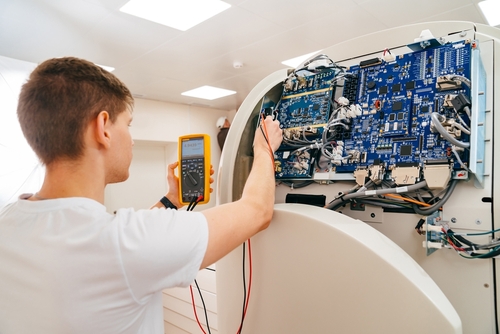
If you have a natural knack for working with machines and technology, you might be surprised to learn that a career in the rapidly growing healthcare industry might be in your future. You don’t need a lengthy, expensive medical education to work as a medical equipment repairer. You just need an undergraduate degree, some on-the-job training and your own technical, mechanical and troubleshooting skills.
The Role of a Medical Equipment Repairer
From hospital beds to defibrillators, medical equipment is becoming increasingly complex. It takes skilled, trained professionals to maintain and repair medical equipment. Medical equipment repairers are also called biomedical equipment technicians (BMET). They are the repair professionals who specialize in working on medical equipment. They use a combination of:
- hand tools
- power tools
- computer software
They install, maintain, fix and calibrate a wide variety of medical equipment from diagnostic imaging scanners to electric wheelchairs. Medical equipment repairers troubleshoot software problems and repair and adjust mechanical and hydraulic parts.
The accuracy of medical equipment is incredibly important. If defibrillators don’t work properly, mechanical and technical failures could cost the lives of cardiac patients. Diagnostic screening equipment can let major health problems go undiagnosed, and get worse, if they don’t work correctly. Medical equipment repairers have patients’ health in their hands. That’s why the right training and education is so important.
Education and Training
Some medical equipment repairers work with relatively straightforward equipment. Others handle very high-tech scanners, devices and other equipment. Exactly which skills you will need for this career depends on what kind of equipment repair your job will entail.
The best way to prepare yourself for a long-term career in medical equipment repair is to earn an associate’s degree. Employers typically prefer a degree in engineering or biomedical technology, according to the United States Bureau of Labor Statistics (BLS). If you intend to maintain and repair especially complex and technical equipment, you may need to earn a bachelor’s degree. Even if you have a degree, expect to spend at least three to six months learning more through supervised on-the-job training.
Medical equipment repairers earn a median salary of $44,570 per year, according to the BLS. That’s well above the $34,750 median annual wage for all occupations. Candidates can often get started with just a two-year degree. Medical equipment repairers who work in hospitals – about 14 percent of all medical equipment repairers – earn the highest wages, with a median of $48,870.
Opportunities for medical equipment repairers are rapidly expanding. The BLS expects a 30 percent increase in the number of positions for medical equipment repairers over just 10 years. This growth rate is nearly three times that of all professions over the same period. These benefits and others, like flexibility and upward mobility, led U.S. News & World Report to rank the career:
- 13th on its list of the Best Health Care Jobs
- 28th among the 100 Best Jobs
Related Resources:
